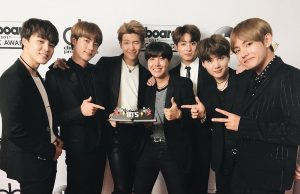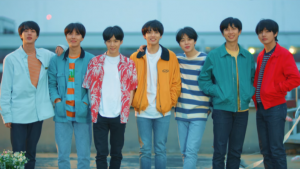 In May, BTS‘ Love Yourself: Tear became the first K-pop group to ever place No. 1 on the Billboard 200, a chart which ranks the week’s most popular albums. This is the second time the group has had a top 10 ranking album, with last year’s Love Yourself: Her peaking at No. 7. Tear is the first primarily foreign-language album to top the chart in over 12 years, and it is also the first Asian-language album to do so. Recently, the Big Hit group also became the first K-pop act to top the Billboard Artist 100 chart.
In May, BTS‘ Love Yourself: Tear became the first K-pop group to ever place No. 1 on the Billboard 200, a chart which ranks the week’s most popular albums. This is the second time the group has had a top 10 ranking album, with last year’s Love Yourself: Her peaking at No. 7. Tear is the first primarily foreign-language album to top the chart in over 12 years, and it is also the first Asian-language album to do so. Recently, the Big Hit group also became the first K-pop act to top the Billboard Artist 100 chart.
As BTS continues to gain recognition in Western media, there has been a lot of talk about the significance of their success, as well as the broader effects it might have. With plenty already said about what these records mean for BTS themselves, now is a good time to sit down and ponder what these accomplishments might bring beyond the group’s own successes.
So for this Roundtable, we ask our writers: How do you see BTS’ achievements influencing the K-pop scene? Could they have an impact on Asian artists in the American music scene? And have you, as a fan, personally noticed any changes with this increased visibility?
 Qing: The significance of BTS’ achievements should not be understated, but beyond novelty and prestige, their record-setting seems to have intensified an existing preoccupation with numbers and rankings. There are two related shifts that may not bode well for K-pop musically and in terms of fan culture.
Qing: The significance of BTS’ achievements should not be understated, but beyond novelty and prestige, their record-setting seems to have intensified an existing preoccupation with numbers and rankings. There are two related shifts that may not bode well for K-pop musically and in terms of fan culture.
Music-wise, the inroads that K-pop groups have been making on American charts could be a chance for K-pop to be taken seriously, opening up opportunities for more collaborations with American producers. Yet there are two catches.
First, is chart position indicative of music quality? I’m not referring specifically to BTS—Love Yourself: Tear is a great album—but their chart performances are symptomatic of the way chart positions in K-pop are being secured nowadays. The music counts on some level, but another huge enabling factor is how dedicated fans are to streaming. If releases achieve results more through streaming and less through merit, it’s hard to say opportunities for dynamic interactions between the music scenes will increase.
Secondly, BTS’ achievements are making it all the more enticing to make music that’s marketable in the American market. K-pop has always taken its cues from Western music trends, but producers have generally been able to mix these elements with a K-pop sensibility. Whether out of coincidence or correlation, 2017 has seen a spike in K-pop that sounds suspiciously, generically American. Perhaps this is why Western reviews keep treating K-pop as a diluted, copycat version of American music.
 Equally upsetting is seeing fan culture escalate into a race for recognition. The emphasis on rankings and records creates a culture of exclusivity: only one group is allowed to be at the top at any point in time. Streaming, radio play, and voting wars have become a staple of fan culture. Conversation about the music itself is often drowned out in a sea of numbers that the media, Korean or abroad, are preoccupied with reporting on. The irony is that these numbers that are supposed to quantify the idols’ success have ended up devaluing their artistry.
Equally upsetting is seeing fan culture escalate into a race for recognition. The emphasis on rankings and records creates a culture of exclusivity: only one group is allowed to be at the top at any point in time. Streaming, radio play, and voting wars have become a staple of fan culture. Conversation about the music itself is often drowned out in a sea of numbers that the media, Korean or abroad, are preoccupied with reporting on. The irony is that these numbers that are supposed to quantify the idols’ success have ended up devaluing their artistry.
Laverne: Call me a wet blanket but I don’t see this is as impactful as K-pop fans want it to be. I’d honestly take it a step further and argue that this changes… nothing. BTS received some well-deserved publicity and recognition, but Asian artists in the American music scene will continue struggling whether they be Asian or Asian American. I believe a cultural shift must occur in order for Asian American artists to “make it” in the U.S., much less Asian artists. And until that cultural shift occurs, instances like this will be sporadic and unmemorable to the public at large.
Obviously, within the K-pop sphere, this is a big deal and the argument could be made that this will impact the K-pop scene. As Qing pointed out, there has been a trend of adopting more and more American pop influences into K-pop. Although most Korean groups focus on the Korean market first and foremost, I do think this is a trend that will continue to occur. This isn’t necessarily bad, but it does create a generic style when trying to emulate even a fraction of the success of BTS.
 Part of BTS’ appeal is the way they masterfully draw influences from different types of genres and create a sound that is organically BTS. And that is what I’d like to see K-pop do more of in the wake of BTS’s success. Rather than copying Western trends, I’d like to see the creation of music that, although it may draw from other genres and influences, retains a sense of uniqueness and artistry that can be easily lost in this fast-paced industry. This may not be completely viable within the K-pop industry, but I hope this is the impact BTS’ success will have.
Part of BTS’ appeal is the way they masterfully draw influences from different types of genres and create a sound that is organically BTS. And that is what I’d like to see K-pop do more of in the wake of BTS’s success. Rather than copying Western trends, I’d like to see the creation of music that, although it may draw from other genres and influences, retains a sense of uniqueness and artistry that can be easily lost in this fast-paced industry. This may not be completely viable within the K-pop industry, but I hope this is the impact BTS’ success will have.
Pat: I also don’t see the fuss and would argue that this changes nothing. In fact, I would argue that the reason American celebrities and Western media are so okay with BTS is due to two reasons. First, they’ve seen, through past K-pop acts winning awards (such as Big Bang way back in the day) that a good part of K-pop fans want recognition of K-pop by the dominant and mainstream West. This has been achieved through awards that are essentially popularity awards—voting and buying albums, be it in bulk or not. Western media is recognizant of this and has used BTS to gain clicks and increase avenue.
The second reason and the one that potentially angers me the most is that American celebrities and Western media are, in a way, seeing BTS as exotic. I won’t get into the long history of the West making the East be this exotic world and all the stereotypes that come with it. The point I am trying to make for the second reason is that BTS is still singing in Korean. They are not trying to make it in America. Thus, there is an increased level of acceptance because they are not a threat. They are not like other Asian Americans trying to make it, who struggle to even get any representation in screen or on the charts due to relatively weak media coverage. BTS is a novelty for the West—a group from the East, from an economically strong country that has even stronger ties to the West, that brings attention to media sites. BTS will also go back to Korea, meaning that the celebrities don’t have to worry about the competition that comes complete with a rabid fanbase.
 That being said, this is all on the West and not BTS themselves. I don’t blame them for taking advantage of their sudden rise, as this experience gives them a strong edge in the Korean market in addition to bringing in additional revenue. I’m also sure that there are some Western reporters who do appreciate BTS’ music. But I’m also a cynic and pessimist at heart. BTS has achieved plenty—maybe one of the less cynical writers would like to jump in and speak on BTS’ achievements?
That being said, this is all on the West and not BTS themselves. I don’t blame them for taking advantage of their sudden rise, as this experience gives them a strong edge in the Korean market in addition to bringing in additional revenue. I’m also sure that there are some Western reporters who do appreciate BTS’ music. But I’m also a cynic and pessimist at heart. BTS has achieved plenty—maybe one of the less cynical writers would like to jump in and speak on BTS’ achievements?
Camiele (Cy): As everyone has said here thus far, and as I’ve been thinking since last year honestly, BTS’s success, quite frankly, is only BTS’s success. In the long run, we live in a country that has seen anything Asian related (no matter what part of Asia) as a novelty. Dating back to the ’30s and ’40s, hell even as recently as someone like Psy, who broke the internet, but was basically meme fodder from then on, never mind his 20 years in the music industry.
This isn’t to diminish BTS’s artistic merits at all. On the contrary. The reason (for the most part) their fans are so dedicated is because their music has touched something inside them emotionally, intellectually, or otherwise. However, that’s not at all a factor when it comes to their success here. They’re the trend of the moment. While I do hope the music eventually will become the leading factor of the attention they receive, the Western market, particularly in the States, doesn’t care about an Asian artist beyond how they can give them a few giggles–all one need to is see that everything they’ve won award-wise as far as the awards themselves and the ones giving them has nothing to do with their music.
 Which, of course, is just a long way of me saying, no, I haven’t seen changes in increased visibility of Korean artists outside our little world of Korean music fans. As I said, BTS’s success is only BTS’s success. While a landmark for them, it doesn’t do much for any other artist. Especially since what they’ve done isn’t the only notable historic accomplishment for a Korean artist (Jay Park being signed to Roc Nation, Dean working with pretty much any Western artist he wants–all he has to do is put it on Instagram–and going back to Wonder Girls being the first Korean act to actually chart within the Billboard Hot 100).
Which, of course, is just a long way of me saying, no, I haven’t seen changes in increased visibility of Korean artists outside our little world of Korean music fans. As I said, BTS’s success is only BTS’s success. While a landmark for them, it doesn’t do much for any other artist. Especially since what they’ve done isn’t the only notable historic accomplishment for a Korean artist (Jay Park being signed to Roc Nation, Dean working with pretty much any Western artist he wants–all he has to do is put it on Instagram–and going back to Wonder Girls being the first Korean act to actually chart within the Billboard Hot 100).
Karen: As an ARMY I have mixed feelings about the whole BTS-Billboard discussion. I have to lay it out there first: I am glad BTS is making it big. But I do get frustrated when it’s no longer their music people are talking about anymore. I remember the fun when reading articles about their music in the past, and HYYH was such a big hit because of its depth. Yet, the spotlight is increasingly placed on their popularity and not their value as musicians and composers—which makes me question, are they really becoming a hit for their music or because they are fascinating to an American audience?
There is certainly something very disturbing with their shot to fame, especially since attention isn’t given to other artists that have made it into the Billboard charts. Mamamoo’s Purple hit No. 1 on Billboard’s World Albums chart last year, but nobody’s talking about that. Tons of Korean artists, including BTS, have topped charts in numerous Asian/non-American countries— but these achievements escape any spotlight. Gaining international fame is applause-worthy, and knowing that there are ARMYs all over the globe is great. But consider this my appeal: “international” needs to go beyond “American.” This is something listeners, and perhaps the K-pop industry itself (including BTS), need to start contemplating.
 Artists do change their music styles from time to time, but as Qing mentioned, watching them produce hits that are increasingly marketable to an American audience makes me sad. Even if they are still singing in Korean, there is a noticeable shift in their music production. Such a situation makes me question if we, as listeners, are obsessed with Billboard rankings and see it as the sole determiner of music quality. And this is clearly not true in so many ways, including viewing rankings as an objective indicator, as well as relying on popularity among an American audience as a form of affirmation.
Artists do change their music styles from time to time, but as Qing mentioned, watching them produce hits that are increasingly marketable to an American audience makes me sad. Even if they are still singing in Korean, there is a noticeable shift in their music production. Such a situation makes me question if we, as listeners, are obsessed with Billboard rankings and see it as the sole determiner of music quality. And this is clearly not true in so many ways, including viewing rankings as an objective indicator, as well as relying on popularity among an American audience as a form of affirmation.
Qing: The biggest issue I have with this all is what Karen is gesturing towards: why does K-pop even need Western validation? There are so many other ways for it to be recognised for its artistry. And if these attempts for recognition only serve to bury the very thing—the music—that fans are trying to get their idols recognition for, then is it really worth it?
Camiele (Cy): What’s troubling is that for many the benchmark of a group’s success, particularly in K-pop where mostly international fans are want to try to separate their faves as far away from the dreaded label of “K-pop” as they can, is whether that group makes big waves in the States. So desperate for their faves to be recognized, they’ll get in pissing contests with anyone who dares question the actual validity of their success. Again, as many have said, their visibility and success overseas is down to 1) the impact they have across social media, and 2) the power of their fandom and how dedicated they are to making sure their numbers are bigger than anyone else’s. This isn’t an old tactic. It goes back as long as idol groups have been a thing (“my fave has more fanclub members than yours” has become “my fave has more YouTube views than yours”). However, at this point numbers are more important than anything else, as if that proves more than just how hellbent a fandom is at making their group #1 at all costs.
Janine: While I agree with many of the points made, my blanket is surprisingly dry.
 I don’t think it’s fair to expect BTS’s success to change the manner in which the West interacts with any culture outside of their own. It’s a bit like expecting Black Panther to end racism: unrealistic. Their commercial success has alerted culture vultures to a market of customers and created a space for many people to try to take advantage of this. <Insert a collective cry against capitalism here> However, like Black Panther has sparked an important conversation about black and African representation, more visibility has resulted in some positive effects.
I don’t think it’s fair to expect BTS’s success to change the manner in which the West interacts with any culture outside of their own. It’s a bit like expecting Black Panther to end racism: unrealistic. Their commercial success has alerted culture vultures to a market of customers and created a space for many people to try to take advantage of this. <Insert a collective cry against capitalism here> However, like Black Panther has sparked an important conversation about black and African representation, more visibility has resulted in some positive effects.
I heard BTS and Exo on two national terrestrial radio stations in South Africa! That’s unprecedented and it was catalysed by the Billboard attention. We can decry Western validation as much as we want, but it still means something to mainstream music distributors and that means access. In South Africa, this success has made a world of difference to me as a fan. I can order a physical album from a record store now. It feels like a big deal when I don’t have to go through a Facebook page run by an unknown admin to get my hands on a photo card.
I also don’t know if I agree that things have changed so drastically in terms of musical quality. Yes, there have been people chasing Western recognition but as Qing pointed out, K-pop has a history of being influenced by mainstream popular music. Can we really say things have changed that much when Seo Taiji and Boys were drawing comparison with Public Enemy back in 1992?
 Maybe we don’t like some of the styles K-pop is currently drawing from, but that’s not a reduction in quality as much as a difference from the familiar. There are still groups making great music and the sheer volume of groups means you don’t only have to enjoy one genre to get into K-pop. There’s a constellation of stars to follow as groups explore EDM, reggaeton, and pop rock. We’ve just got to find our stars.
Maybe we don’t like some of the styles K-pop is currently drawing from, but that’s not a reduction in quality as much as a difference from the familiar. There are still groups making great music and the sheer volume of groups means you don’t only have to enjoy one genre to get into K-pop. There’s a constellation of stars to follow as groups explore EDM, reggaeton, and pop rock. We’ve just got to find our stars.
Gaya: That’s a really good point about culture vultures, Janine. We sometimes make the mistake of letting their involvement tarnish our appreciation of very real achievements; it’s good to separate the two, distinguishing newfound genuine interest from calculated bandwagoning.
On Karen’s point about Mamamoo, topping Billboard’s World Album Chart has happened a few times already, and while the achievement should be celebrated, there is an air of it not being as special since it’s been done before. Billboard has been courting K-pop for a while, and BTS has made the most of that opportunity, thanks to their company’s savvy, the members’ appeal and fans’ dedication, all of which is rooted in BTS’ music.
One thing I would like is more media outlets reaching out to other K-pop groups, like Buzzfeed’s “Would You Rather” video with EXID. Sure, they got BTS on first because of their popularity, but doing so seemed to have given them the chance to play around with the logistics and format to find something that allows for more genuine attempts at inclusion (as opposed to suggesting Hyuna as Justin Bieber‘s next girlfriend). With more K-pop fans taking on roles in the media, like Tamar Herman, Monique Melendez, Riddhi Chakraborty and Ellie Lee, among others, this authenticity can only grow.
 And while the same fan wars are still being waged sadly, it has at least given me the chance to learn more about the history of international K-pop fandom. As someone who came in after YouTube blew up, it was interesting to see how fans accessed music videos and how long it took to download things. When Johnelle was heading our 5 Things segment, she would download entire K-variety show episodes, make her own cuts, then upload those cuts. Now, I can simply go to the broadcaster’s official YouTube page and embed a readymade cut with subs. It’s great to take stock of the ways K-pop consumption has changed over the years–it would be nicer if it could be a more even and warmer exchange of information, though, rather than being presented as a series of clapbacks.
And while the same fan wars are still being waged sadly, it has at least given me the chance to learn more about the history of international K-pop fandom. As someone who came in after YouTube blew up, it was interesting to see how fans accessed music videos and how long it took to download things. When Johnelle was heading our 5 Things segment, she would download entire K-variety show episodes, make her own cuts, then upload those cuts. Now, I can simply go to the broadcaster’s official YouTube page and embed a readymade cut with subs. It’s great to take stock of the ways K-pop consumption has changed over the years–it would be nicer if it could be a more even and warmer exchange of information, though, rather than being presented as a series of clapbacks.
Aastha: My sentiments seem to be similar to most. BTS’ accomplishments didn’t feel as significant towards the K-Pop industry as some fans were making it to be. While Korea seems to recognise BTS as the torchbearer of the industry, their achievements in America seem to be due to the fact that they’re exotic and new, and have a dedicated fandom.
 However, like Janine mentioned, BTS tapping into the Western market—and so successfully, at that—is an admirable feat. Regardless of the reasoning behind BTS’ popularity in the West, they have gained countless accolades over the past years, and it has led to a greater awareness of K-pop. It’s difficult to say how much of this awareness would translate to a greater K-pop fanbase, but at least the audience have means to learn more about the industry should the curiosity arise. As Gaya stated, with media such as YouTube, along with Spotify and Apple Music, the spread of K-Pop has gotten easier. BTS’ popularity does make K-Pop and the culture more known, but it’s too optimistic to think that it would increase fans of other Asian artists or music in general. Since the drive behind BTS’ Western success is the novelty of it all, it seems unlikely that this concentrated visibility would carry over to other artists.
However, like Janine mentioned, BTS tapping into the Western market—and so successfully, at that—is an admirable feat. Regardless of the reasoning behind BTS’ popularity in the West, they have gained countless accolades over the past years, and it has led to a greater awareness of K-pop. It’s difficult to say how much of this awareness would translate to a greater K-pop fanbase, but at least the audience have means to learn more about the industry should the curiosity arise. As Gaya stated, with media such as YouTube, along with Spotify and Apple Music, the spread of K-Pop has gotten easier. BTS’ popularity does make K-Pop and the culture more known, but it’s too optimistic to think that it would increase fans of other Asian artists or music in general. Since the drive behind BTS’ Western success is the novelty of it all, it seems unlikely that this concentrated visibility would carry over to other artists.
BTS’ musicality has also improved over the recent years, too, with a wider range of genres and dance styles. It might not be right to say that it’s all due to their international recognition, but I do think that it plays some part in it. The heightened expectation and visibility has definitely pushed the members to go beyond their boundaries, to talk about social issues applicable not only to Korea but other countries as well, and that’s probably one of the reasons they’re only gaining more international attention as they go on. That being said, “Western validation” has become a sick competition between fans, with exhausting fan wars. Then again, fan wars have been always been part of K-pop, and “western validation” is just another fuel for the fire.
(Images via Big Hit Entertainment, Billboard)


